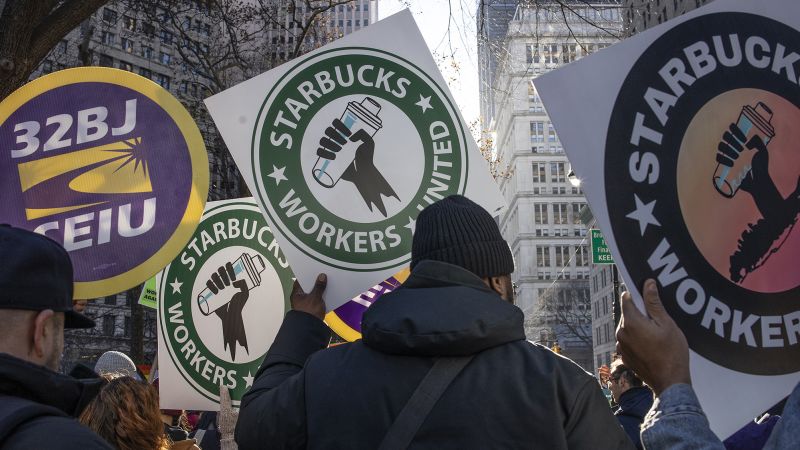
New York
CNN
—
Starbucks’ investors have voted in favor of an independent review of the company’s aggressive anti-union efforts.
During the company’s annual shareholder meeting last week, investors approved a proposal to have the board of directors “commission and oversee an independent, third-party assessment of Starbucks’ adherence to its stated commitment to workers’ freedom of association and collective bargaining rights.” The proposal pointed to allegations that the company intimidated workers and retaliated against them in its battle against the union, saying that the reports put the company at reputational and legal risk.
The assessment would include remedies if it finds that Starbucks has broken its own stated commitment to workers rights.
Results of the vote were shared Wednesday afternoon in a Starbucks SEC filing. The company had previously recommended that shareholders vote against the proposal, saying that it has already started working on a human rights review and maintaining that it has been acting legally.
Shareholder proposals like this are not binding. But companies that ignore proposals that have been approved may anger their investors.
“I think it’s pretty clear at this point that a majority of Starbucks investors are concerned about the company’s approach to worker rights,” said Jonas Kron, chief advocacy officer at Trillium Asset Management, which was a proponent of the proposal along with New York City Comptroller Brad Lander and others.
Over the past year and a half, Starbucks has been waging a bitter fight against unionization efforts. The first Starbucks location voted to unionize in December 2021, and since then nearly 300 locations have voted to unionize and been certified by the National Labor Relations Board. About 60 have voted against unionization and been certified by the NLRB.
There are roughly 9,300 company-operated US Starbucks stores in the United States, so unionized locations are still relatively few for now. But their victories have been hard won.
During a hearing before the Senate Health, Education, Labor, and Pensions Committee about the company’s labor practices on Wednesday, one former employee said he was wrongfully fired after organizing. One barista who is still with the company said that after her store started organizing a union, workers were disciplined for being a few minutes late or over small dress code violations.
NLRB administrative law judge Michael Rosas recently wrote that Starbucks displayed “egregious and widespread misconduct” in its dealings with employees involved in efforts to unionize Buffalo, New York, stores, including the first location to unionize. Starbucks repeatedly sent high-level executives into Buffalo-area stores in a “relentless” effort, the judge wrote, which “likely left a lasting impact as to the importance of voting against representation.”
Starbucks said in a statement at the time of Rosas’ order that it is “considering all options to obtain further legal review,” adding that “we believe the decision and the remedies ordered are inappropriate.”
Starbucks’ Chairman Emeritus Howard Schultz, who was interim CEO from April 2022 until March of this year, also faced questions during Wednesday’s hearing, which concluded before the results of the vote on the shareholder proposal were revealed. Schultz said that Starbucks has been acting legally, and that findings against it merely amount to “allegations.”
But the claims failed to convince his critics.
“Senate testimony from former CEO Schultz continues to ring hollow against the numerous complaints from workers,” said Lander in a statement Wednesday. “The majority support from shareholders for our proposal reflects a growing demand for an honest accounting of the discrepancy between Starbucks’ purported values and management’s anti-union behavior.”
Starbucks Workers United said in a statement that the results of the vote show “how worried shareholders are about Starbucks’ behavior towards our union under Howard Schultz’s leadership.”
In its filing Wednesday, Starbucks said that it is “undertaking an independent, third-party human rights impact assessment, which will include a deeper-level review of the principles of freedom of association and the right to collective bargaining.” The assessment is designed to inform leaders “of any changes we can make to our operations to improve the partner experience,” Starbucks said.
“Together these actions represent a broader commitment than the shareholder proposal requests,” the company said.
It’s not clear whether that will be enough to assuage investors, however.
“There’s no discussion in there of remedy,” said Kron. “That’s really actually quite important.”
And “there continues to be a lack of clarity about what standard they’re going to be assessing themselves against,” Kron said. “They’re being very hand wavy about exactly what it is that they’re doing.”
Kron hopes that the results of the proposal will encourage Starbucks’ new CEO Laxman Narasimhan and current board leadership to take a different approach to the union.
They “can look to this vote as indicating there’s investor support for a pivot — that they really are in a position to change behavior now.”